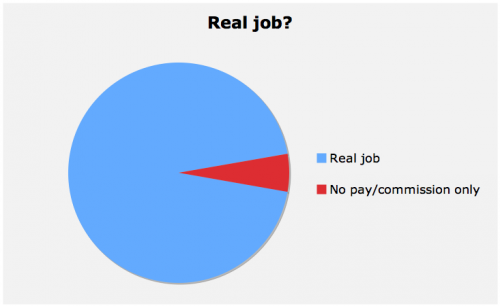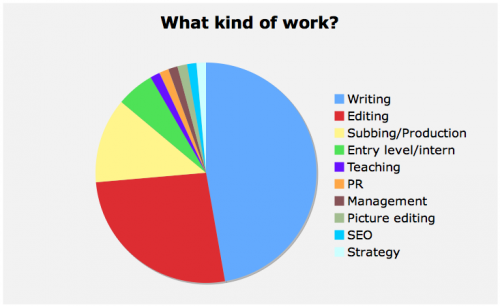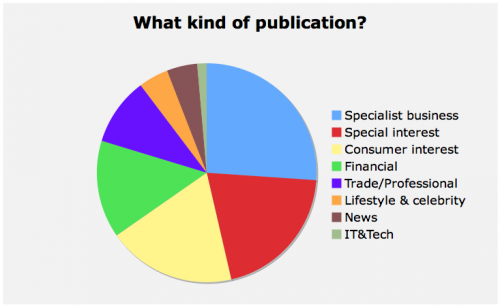Monday, November 1, 2010...9:30 am
UK journalism jobs – a graphical guide
There are more journalism jobs around these days by the looks of the classified ads on sites such as Journalism.co.uk. But what is the jobs market actually like?
Journalism students are generally obsessed with sport, celebrity and music as topics of interest. How will they fare in the media jobs market?
And most journalism commentators seem obsessed with general news reporting as the yardstick of the industry. What are the opportunities like in that most archetypal of roles – the news reporter?
Here is a recent set of Journalism.co.uk jobs, with the numbers crunched to show what kind of work is available, in which kinds of publication, and where they are based.

First off, are these real jobs? There is already a trend for not-real-jobs to be advertised as if they are proper paid employment. This set of ads is not bad – there are only 4 out of 72 that are not paid. Three of those are internships, and one is that weird advertising commission model used by Suite 101.

Second, are these in the business or consumer media? There’s a slight edge to business (b2b), but a more or less even split. Note that the business press barely registers with most journalism students, so that’s a little over half the jobs on offer that will be off their radar.

How about job titles? This one is a bit tricky to process, as many of the jobs on offer are veering off from the traditional journalism demarcation that has defined the industry.
What is an “online community manager”, for example? There were three of those on offer from Yelp that week. I’ve defined them as “editor”, but they could be part of an entirely different category. We’re at the start of big change in how we define our roles.
Top of the list is writing – or variants of it (I’ve also counted some section editor jobs as “writing”, as that’s what you end up doing a lot of). We’re still big on content production, it seems. Then there are a lot of fully fledged editor jobs, and then a much smaller slice of production roles. Like it or not, the old subbing/production desk career is being squeezed dramatically. Or at least changed…

Where is the media based these days? Unsurprisingly, London is still the place to be if you want to work in journalism. There’s also a surprisingly resilient niche in the United Arab Emirates, despite Dubai’s recent financial woes.
Apart from that, the biggest slice of UK regional jobs is taken up by Bath-based Future Publishing (which is nice, as that’s where I am), and those remote Yelp online community management roles. (I counted Crawley and Luton as “London”, as they’re kind of in the catchment.)
Which means that, if you want to start in journalism there’s only one place to be. And, given how expensive it is to live in London, and how rubbish journalism-type salaries are, that really sucks.

Finally, what kind of publication is hiring these days? This is the toughest to define and readers may take issue with my categorisation.
As a guide, Your Horse and the Official Nintendo Magazine are “special interest”, while travel editing for AOL counts as general “consumer interest”. “Financial” is separate from “specialist business” partly because it is a big sub-niche of the business media, and partly because journalism students need to understand why they should not ignore economics and finance. “Specialist business” is all other business type media, from The Grocer to reporting on the pharmacy sector. “Trade/professional” covers media aimed at professional groups, such as lawyers and architects. Yes, I know – you would have done it differently. And you would probably have been right.
The most telling items in the chart are the tiny slices for lifestyle and celebrity – the most popular media choices for J-students – and for general news reporting. Very few jobs are advertised in these areas (at least here).
There is life in the media jobs market, it seems – but you need to be prepared to take that job on Meat Trades Journal if there’s nothing available on Heat magazine right now…
(Jobs sourced from Journalism.co.uk on Friday October 22, 2010)
Leave a Reply